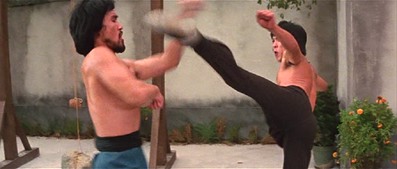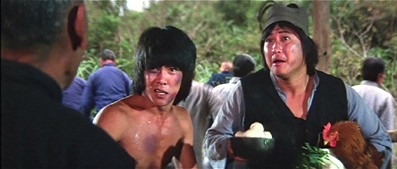|
If
you're new to 70s/80s Hong Kong martial arts comedies, the
early scenes in Sammo Hung's 1979 Knockabout [Za jia xiao zi] –
with its bad jokes, silly slapstick and wildly exaggerated
pantomime acting – will probably leave you wondering just what the
hell was going through Bey Logan's mind when, on the commentary
track, he describes it as a genre classic. But, comedic
mugging aside, this is par for the course in this particular
sub-genre, setting your lead characters up as buffoons who
make out they're tougher than they are (it's still happening
– check out Stephen Chow's recent Kung-Fu
Hustle), only to have them later learn the skills that will
enable them to show their worth. Thus the comedy comes first
and the real action comes later. And believe me, it does
come.
The
story centres around two hapless confidence tricksters Yipao and Taipao,
who after failing to con and later mug an old man known
as Silver Fox, beg him to take them on as students after
he proves a far better fighter than either of them. He reluctantly
accepts and trains the two, but unbeknown to them he is
not quite who he seems.

There's
actually quite a bit more plot than this brief summary suggests,
including a couple of surprise twists, but the meat of the
film lies initially in its comedy – which is as broad as
the Yangtze and very much a matter of taste – and its action,
which starts small and steadily builds as Yipao and Taipao
develop their skills. Early fights are played at least in
part for laughs, with Taipao repeatedly kicked over the
same table in a set-piece that looks straight out of acrobatic
clown school, and Yipao tapping a goon on the shoulder with
his raised leg, mesmerising him with his foot,
and then kicking him over. If never really laugh-out-loud,
these moments are still a good deal of fun and generally play
better than the straight-up silliness, though the sequence
in which Yipao and Taipao hungrily devour a large meal in
a series of rapid-fire cuts put a wide smile on my face.
Music cues are borrowed from Ennio Morricone (The
Good, The Bad and The Ugly) and Alex North (Cross
of Iron); two gay kung-fu assassins beat the pair
up and walk off hand-in-hand (I know, but this is Hong Kong
in 1979); people get hit and immediately break out in saucer-sized
bruises; and in one particularly outlandish case, the victim
accumulates a series of tennis-ball sized lumps on his head.
Given
that the film was promoted as a showcase for the skills
of first-time star Yuen Biao*, you just know that something
special is on the way, but we're over half-an-hour in before
we get a real flavour of what we're in for, as Yipao and
Taipao spar following a training session with Silver Fox.
Later, Yipao develops his skills further (and engages in
some even more vigorous physical comedy) when he teams up
and trains with a beggar who is blessed with impressive fighting
skills; as played by director Sammo Hung, a genre legend in his own
right, he is a man whose grace, speed and skill belie his bulk.
It is here that Yuen really gets to show what he can do
in an eye-popping ballet of fast, precise and gorgeously
acrobatic martial arts moves, followed by an extended scene
in which he leaps, hops and backflips over a skipping rope,
pre-figuring the punch line of the climactic fight. By then
the plot has essentially dried up and the comedy has been
put largely on hold, paving the way for a first-rate three-way
display of varied martial arts, the beggar's self-proclaimed
'mish-mash' style.
Held
in high regard by many genre fans – Bey Logan included –
Knockabout is very enjoyable stuff, the
dumb-and-dumber comedy tending to grow on you as the story
progresses and as it becomes increasingly integrated into the action. But
the film moves into a different gear once Sammo himself
takes a key role, really showing both Yuen's skills as acrobatic
fighter and Sammo's own as both a performer and action director,
all of which contribute to providing a final third that
should satisfy even the most demanding genre fan.
Fully
restored from a high-definition master, this is another
fine transfer from Hong Kong Legends, some minor contrast
inconsistencies in the night scenes being the only visible
flaw. Contrast, colour and sharpness are otherwise impressive, black
levels are generally fine, and there's barely a dust spot
to be seen. The picture is framed 2.35:1 and anamorphically
enhanced.

There
are three soundtracks available: the original Cantonese
mono, a 5.1 remix and the expected (American) English dub,
also 5.1. Unlike many previous HKL 5.1 tracks, this really
is a remix and an impressive one – separation is excellent,
with very good use of the rear speakers (as you watch one
fight, another audibly plays out behind you) and the sound quality
surprisingly good. The English dub, as Bey Logan points
out on the commentary, has its entertainment value.
Well
if you've got this far you'll already know that there's
a Commentary by Bey Logan, an almost inevitable
but always welcome inclusion for a Hong Kong Legends release.
As usual, Logan is loaded with information on the actors,
the locations, the director and other related genre works,
a fair few of which I have yet to catch. He barely pauses
for breath here, even interrupting himself mid-sentence
to comment on the on-screen action, translate the Chinese lettering on signs, and
even talk about the food being eaten. An essential companion
to the film.
The
Trailer Gallery features the UK Promotional
Trailer (1:42), which is for this very DVD and rare
in that it has an English narration rather than being by
the usual deep American Trailer Voice Man. The Original
Theatrical Trailer (3:53) is anamorphic 2.35:1 and
seems to have been restored with the same care as the main
feature and is a very good sell.
Heavy-Hitter
(7:09) is an interview with director, action choreographer
and co-star Sammo Hung, who talks about the casting and
the abilities of his performers, and reminds us that one of
the pricipal appeals of Hong Kong actioners is that the
actors can really do the moves and are not being faked by
special effects. The interview was in Cantonese with English
subtitles and in anamorphic widescreen, as are all the other
extras except...
Above
the Law (7:18) has actor Leung Ka Yan (who
plays Taipao) talking about how he got into movies, how
he learned martial arts and his experience of working on
Knockabout. This one is non-anamorphic
widescreen and has the film title stamped large over all
extracts, suggesting an interview that has been bought in
rather than recorded specifically for this disk.
Monkey
Magic interviews Chan Sau-Chung, a master
of monkey kung fu (yes, it's a real style). His story is
almost the basis for a martial arts movie plot in itself,
having learned kung fu in order to be able to defend himself
after being repeatedly bullied at school. He provides a
history of the monkey kung fu style and an outline of its
techniques, and talks at some speed – look away for a moment and
you'll miss three subtitles.
Back-to-Red
(3:44) gets a mention on the commentary track and was the
original intro to the film, a sort of overview of the techniques
that Yuen was to use, performed against a plain red backdrop,
an a common feature of martial arts movies of
the time. There's also some comedy-action interplay with
Sammo Hung. It's pretty impressive stuff, and framed anamorphic
2.35:1
Whether
Knockabout is the masterpiece Bey Logan
claims is very much in the eye of the beholder, but it's
certainly a great deal of fun. Certainly if you can stomach the outrageous
mugging in the first third there is a great deal to admire
and enjoy, and the final act is worth the price of admission
alone.
Hong
Kong Legends have done it again with this DVD, supplying
a fine transfer, an impressive sound remix, an information-packed
commentary and some interesting extras. For martial arts
movie fans, another must-have.
|